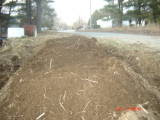I learned about Peak Oil a couple of years ago. Links will be provided below, but the executive summary is that when the global oil supply is half depleted, we will no longer have the cheap oil that keeps our civilization running.
The scariest thing about Peak Oil is that it will lead to Peak Food. No more Cheap Oil = No More Cheap Food.
Wendell Berry, a poet and old fashioned Kentucky farmer, at a symposium called “Fast Food World”[1] said something along the lines of Industrial Farming now feeds a global population of 7 billion people.
However, Industrial Farming rests on a shaky tripod of Water, Soil, and Oil. If any of these legs breaks, Industrial Farming breaks.
Industrial Farming requires much more water than Natural Farming. It’s not just to “water the plants.” Industrial Farming require water to dissolve the chemical fertilizers. It’s like when you are more thirsty after eating a bag of Doritos than a salad. Pumping this extra water to the fields requires extra fuel of course, and one drought can ruin our whole year. Here are some quotes about the global water crisis and agriculture:
“In 1995, World Bank vice president Ismail Serageldin predicted an acute water shortage for the new millennium: "If the wars of this century were fought over oil, the wars of the next century will be fought over water."
“While the world’s population has tripled, water demand has sextupled”
“Now 65 percent of the world's fresh water flows into industrialized agriculture, which requires huge irrigation projects.”[2]
So what we have is a situation where Industrial Agriculture is hogging the world’s potable water – 65% of it! Your garden out back, or the local CSA farm certainly isn’t doing this. If you grow and/or buy locally, you are already doing some small part to conserve the world’s potable water.
Soil erosion. Fifty years ago, the American Midwest had an average of 12 feet of topsoil. [3] Now there is six feet, and more is eroded every year. If we don’t run out of water or oil first, then soil erosion will finish the job. Another quote about soil, or “land.”
Land: On-going soil erosion and expanding urbanization contribute to the continuous loss of cropland in the U.S. Annually, more than two million acres of prime cropland are lost to erosion, salinization, and waterlogging. In addition, more than one million acres are removed from cultivation as America's limited arable land is Overwhelmed by the demands of urbanization, transportation networks, and industry. As a result of arable land shortages, U.S. meat consumption may be reduced. [4]
Again, supporting local agriculture and/or growing your own garden will go a long way towards abating this problem. Industrial Agriculture is one Big Bad Guy among a few others causing a lot of the soil contamination and erosion, and the less food you buy at the supermarket, the better.
Oil. On average, the food from the supermarket required 10 calories of oil for every one calorie of food, and this doesn’t even include transportation. When you think about it, isn’t it crazy and stupid to be trucking in potatoes from Idaho and tomatoes from California(!) while we build more housing developments in Connecticut? Shouldn’t we be growing our potatoes and tomatoes right here? Of course we should!
Why don’t we do this? Two reasons. First, the people who are making lots of money off this way of doing things go ahead and do it without regard to the consequences. Second, we, that is, you and me, don’t do anything about it. It’s that simple.
Professor Richard Heinberg of www.museletter.com asks the question, “Do the Folks in Charge know what they are doing?” The answer to this rhetorical question is a resounding “No!”
This is a difficult thing to get your mind around. The rulers who are creating the catastrophe don’t care that they are creating a catastrophe, and they don’t care if you die. They have their food supplies and their bunkers, and the hell with you.
You are like the Irish people locked in steerage on the Titanic. The ship is going down, and they aren’t going to let you on their rowboats. It’s up to you to build your own rowboat, in cooperation with your relatives, friends, and neighbors.
There are a few people who dispute Peak Oil based on the “Abiotic Oil” theory. Here is Professor Heinberg’s summary and response to abiotic theory http://www.museletter.com/archive/150b.html
If you follow the Peak Oil debate and discussion, I believe you will conclude, as I have, that Peak Oil is real, and it is upon us or nearly so.
Even if it isn’t, there is every other reason in the world to take up local agriculture. And if it is, then you should support local agriculture like your life depends on it.
Here is the definitive article on the relation of Oil to the Food Supply:
http://www.fromthewilderness.com/free/ww3/100303_eating_oil.html
Here are some Peak Oil sites.
www.kunstler.com
www.lifeaftertheoilcrash.net
www.urbansurvival.com
www.peakoil.com
http://www.deconsumption.typepad.com/
[1] www.tucradio.org the program is called “Fast Food World” with Eric Schlosser, author of “Fast Food Nation” Vandana Shiva, Wendell Berry, and Michael Pollin
[2] http://www.hermes-press.com/water.htm
[3] www.tucradio.org the program is called “Fast Food World” with Eric Schlosser, author of “Fast Food Nation” Vandana Shiva, Wendell Berry, and Michael Pollin
[4] http://www.dieoff.com/page40.htm

2 comments:
Hey, thanks for your comment on my blog.
I think you're absolutely right about local economies; that's one possibility.
Although, compelling people to do something that does not offer competitive benefits is never a good idea.
So, while our only hope is local economic development, the solution must be coordinated among all the states--and it starts by fixing the monetary system.
Thanks again for visiting! And please come again.
We must work together if we hope to survive.
Peace.
Hi!
what's your email address?
btw, i replied to your comment at my blog.
Peace.
Post a Comment